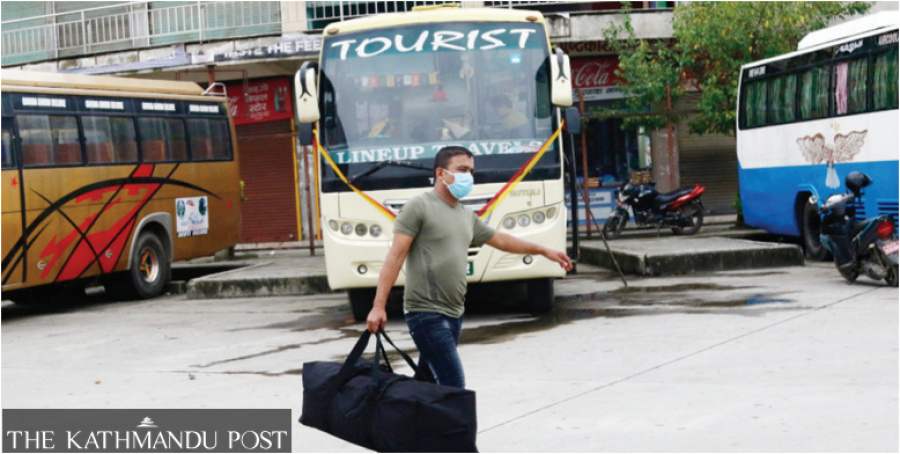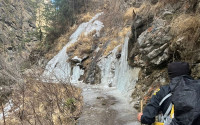National
As long-route buses are garaged, small vehicles are fleecing passengers
Some unscrupulous vehicle operators are misusing travel passes meant for emergencies and charging passengers up to three times the normal fare.
Anup Ojha
It has been nearly three months since the buses operating on long routes remain garaged owing to the Covid-19 restrictions. But after the government lifted restrictions on domestic flights and local transport a few weeks ago, transport operators have been pressuring the government to allow them to resume long-route transport services.
The Federation of Nepalese National Transport Entrepreneurs, the umbrella body of bus operators, has sent several delegations to the Department of Transport Management and the Kathmandu District Administration Office to press its demand for lifting the ban on long-route buses.
While the government has not reopened long-route public transport amid warnings by public health experts against blanket lifting of restrictions on public transport, some unscrupulous operators of small vehicles have been operating on long routes and charging passengers up to four times the normal fares.
Consumer rights activists have flayed the poor monitoring of restrictions by the government and its failure to take action against the overcharging transporters.
“The government has banned long-route vehicles but local bodies are issuing travel passes to vehicle operators close to them. And these well-connected small vehicle operators have used the pandemic as an excuse to fleece hapless passengers,” said Jyoti Baniya, president of Forum for Protection of Consumer Rights.
“The government appears to be doing nothing to stop this daylight robbery. If the government wants, it can stop such vehicles at the various checkpoints along the highways and take action,” fumed Baniya. He claimed that some local governments have been issuing travel pass to such vehicles in exchange for bribes.
Although long-route buses are not in operation, records at the Metropolitan Traffic Police Division show that around 5,000 people have been entering the Kathmandu Valley daily and about fifty percent of them travel on small vehicles that have travel passes issued by various district administration offices.
The division’s data show nearly 4,000 passengers leave Kathmandu every day.
Anyone visiting Kalanki, Balkhu or Koteshwor finds small vehicles with travel passes ready to leave the Valley. These vehicles have been charging passengers exorbitant fares citing the pandemic restrictions.
“If you are ready to pay two to three times the normal fare, you can travel to any district from Kathmandu,” said Anuj Bagale, a pharmacist, who was seen boarding a microbus to Lamjung from Kalanki last Friday.
“The actual microbus fare for Kathmandu to Lamjung is Rs400, but I had to pay Rs900,” said Bagale. He said he paid the fare without complaining because he was on an important business.
Last week Sesan Ghale of Pokhara, who works at a private firm in Kathmandu, paid a van Rs2,500 to visit Kathmandu. “I had no option because my office has reopened and I got a call to join the office,” said Ghale.
Ghale and Bagale are representative cases as a large number of passengers who need to travel long routes are being forced to pay exorbitant fares by transport operators.
“This is a serious crime against helpless passengers but the government has been turning a blind eye to these malpractices,” said Baniya.
Yogendra Karmacharya, chairman at the federation, admitted that a few vehicle operators who have connections with government authorities are making good money by misusing travel passes.
“Transport operators who have invested huge amounts of money in big buses and are in huge debts have been forced to leave their buses rusting in garages. But they are allowing small vehicles to fleece passengers. This is ridiculous,” said Karmacharya of the federation.
There are around 300 transport organisations under the federation from across the country. The federation oversees the operation of around 400,000 public vehicles.
When the Post contacted Kali Prasad Parajuli, the chief district officer of Kathmandu, and asked why have the authorities allowed vehicle operators to misuse travel passes, he said the passes are meant for emergency travel and should not be misused. “We had instructed the traffic police to give travel permission only during emergencies. If vehicle operators are overcharging passengers they should be punished,” said Parajuli, adding that he would raise the issue with traffic police.
Deputy Superintendent of Police Sunil Jung Shah at the Traffic Police Division in Kathmandu said his office has increased vigilance against those misusing travel passes and said a total of 104 public vehicles both small and big (jeep, van micro and buses) have been booked for overcharging passengers in the nearly three months of the prohibitory orders period.
“If we receive a written complaint from passengers, we charge the vehicle operators under the Black Marketing Act,” said Shah.
“But the problem is that passengers seldom come to the police,” said Shah.




 11.43°C Kathmandu
11.43°C Kathmandu.jpg)













